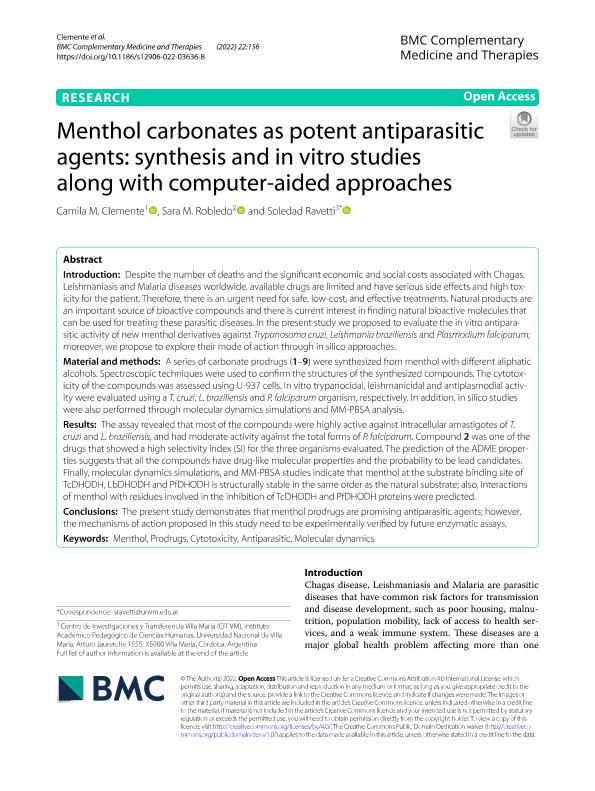Artículo
Menthol carbonates as potent antiparasitic agents: synthesis and in vitro studies along with computer-aided approaches
Fecha de publicación:
06/2022
Editorial:
BioMed Central
Revista:
Bmc Medicine
ISSN:
1741-7015
e-ISSN:
2662-7671
Idioma:
Inglés
Tipo de recurso:
Artículo publicado
Clasificación temática:
Resumen
Introduction: Despite the number of deaths and the significant economic and social costs associated with Chagas, Leishmaniasis and Malaria diseases worldwide, available drugs are limited and have serious side effects and high toxicity for the patient. Therefore, there is an urgent need for safe, low-cost, and effective treatments. Natural products are an important source of bioactive compounds and there is current interest in finding natural bioactive molecules that can be used for treating these parasitic diseases. In the present study we proposed to evaluate the in vitro antiparasitic activity of new menthol derivatives against Trypanosoma cruzi, Leishmania braziliensis and Plasmodium falciparum; moreover, we propose to explore their mode of action through in silico approaches. Material and methods: A series of carbonate prodrugs (1–9) were synthesized from menthol with different aliphatic alcohols. Spectroscopic techniques were used to confirm the structures of the synthesized compounds. The cytotoxicity of the compounds was assessed using U-937 cells. In vitro trypanocidal, leishmanicidal and antiplasmodial activity were evaluated using a T. cruzi, L. braziliensis and P. falciparum organism, respectively. In addition, in silico studies were also performed through molecular dynamics simulations and MM-PBSA analysis. Results: The assay revealed that most of the compounds were highly active against intracellular amastigotes of T. cruzi and L. braziliensis, and had moderate activity against the total forms of P. falciparum. Compound 2 was one of the drugs that showed a high selectivity index (SI) for the three organisms evaluated. The prediction of the ADME properties suggests that all the compounds have drug-like molecular properties and the probability to be lead candidates. Finally, molecular dynamics simulations, and MM-PBSA studies indicate that menthol at the substrate binding site of TcDHODH, LbDHODH and PfDHODH is structurally stable in the same order as the natural substrate; also, interactions of menthol with residues involved in the inhibition of TcDHODH and PfDHODH proteins were predicted. Conclusions: The present study demonstrates that menthol prodrugs are promising antiparasitic agents; however, the mechanisms of action proposed in this study need to be experimentally verified by future enzymatic assays.
Palabras clave:
ANTIPARASITIC
,
CYTOTOXICITY
,
MENTHOL
,
MOLECULAR DYNAMICS
,
PRODRUGS
Archivos asociados
Licencia
Identificadores
Colecciones
Articulos (IMITAB)
Articulos de INSTITUTO MULTIDISCIPLINARIO DE INVESTIGACIÓN Y TRANSFERENCIA AGROALIMENTARIA Y BIOTECNOLÓGICA
Articulos de INSTITUTO MULTIDISCIPLINARIO DE INVESTIGACIÓN Y TRANSFERENCIA AGROALIMENTARIA Y BIOTECNOLÓGICA
Articulos(CCT - CORDOBA)
Articulos de CTRO.CIENTIFICO TECNOL.CONICET - CORDOBA
Articulos de CTRO.CIENTIFICO TECNOL.CONICET - CORDOBA
Citación
Clemente, Camila Mara; Robledo, Sara M.; Ravetti, Soledad; Menthol carbonates as potent antiparasitic agents: synthesis and in vitro studies along with computer-aided approaches; BioMed Central; Bmc Medicine; 22; 156; 6-2022; 1-14
Compartir
Altmétricas




